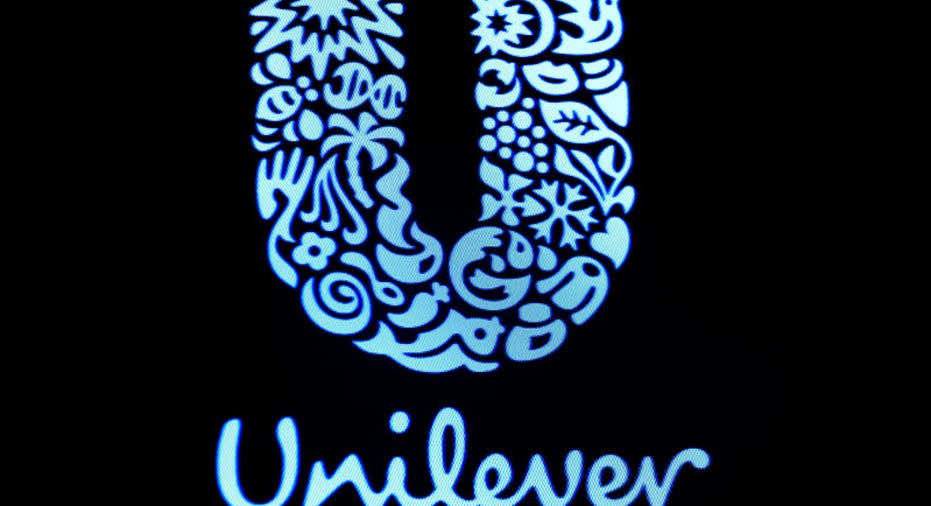Unilever promises cash to shareholders after rebuffing Kraft approach

LONDON – Unilever promised a multi-billion euro program of shareholder rewards on Thursday after a corporate rethink sparked by a takeover approach from Kraft Heinz , aiming to prove it can generate lucrative returns as an independent company.
Under a restructuring sparked by the rebuffed $143 billion offer by its U.S. rival, the maker of Dove soap and Knorr soup set out an accelerated cost-saving plan, the sale of its Flora to Stork spreads business where sales are declining, and a review of its dual-headed Anglo-Dutch structure.
Unilever will also splash out 5 billion euros ($5.3 billion) on a share buyback and raise its dividend 12 percent this year.
Unilever, one of Europe's biggest blue-chip stocks, called the Kraft episode a "trigger moment" to assess its business, as the global packaged goods industry faces slowing growth and greater competition.
Some analysts had speculated it would split into two in a dramatic strategy reversal, but executives said the current strategy was working while needing to be speeded up.
"We need to accelerate our plans to unlock further value faster, and this was brought home to us by the events of February," Chief Executive Paul Polman said.
"There is no doubt that however ... opportunistic it (the Kraft approach) was, it did raise expectations," Polman said. "We are absolutely determined to use it as an opportunity to place Unilever on an even stronger footing."
Unilever executives said their strategy of long-term steady growth had found support in talks they had held with investors including all of the group's top 50 shareholders.
STRONG POSITION
GAM fund manager Ali Miremadi, who manages two worldwide equity funds that are 2.5 percent invested in Unilever shares, said the announcement was in line with expectations.
"They're not stretching here, and nor should they. They're in a very strong position and this is hopefully a sign they're going to be a bit leaner and more shareholder-focused," Miremadi said, adding Unilever should be able to deliver the premium Kraft was offering or more over the next four or five years.
Unilever's London-listed shares, which hit a record 4,088 pence in recent weeks ahead of Thursday's announcement, were up 1.3 percent at 3,989p by 1036 GMT, outperforming the FTSE 100 which was down 0.4 percent.
The group said it would speed up a cost-savings plan, targeting a 20 percent underlying operating margin, before restructuring expenses, by 2020, up from 16.4 percent on the same basis in 2016.
The company previously forecast 4 billion euros of savings from 2017 to 2019 and has raised that to 6 billion. That includes doubling the savings target within brand and marketing investments to 2 billion euros and increasing supply chain savings from 3 billion euros to 4 billion.
About two thirds of these savings are to be reinvested in the business. It also sees 3.5 billion of restructuring costs over the three years.
Pitkethly told Reuters that much of the margin improvement would come from the food business, which it plans to combine with the refreshment business, which includes Ben & Jerry's ice cream and Lipton tea.
SHARE BUYBACK
Unilever also said it would take on more debt, at least in part to finance acquisitions, targeting net debt of two times core earnings or EBITDA. Its leverage ratio has been below one time for more than half of the past 20 years, Jefferies analysts have said.
"Some had speculated Unilever could go to three times to free up even more cash, but it���s remaining fairly conservative," said Neil Wilson, senior market analyst at ETX Capital in London. "The move ought to deter speculative bids such as that of Kraft Heinz. Unilever was vulnerable to a takeover exactly because it���s been so free of debt."
Polman also signaled the company might be interested in the food brands being sold by Reckitt Benckiser , saying it would have to decide what position to take.
The group will launch a share buyback this year of 5 billion euros having not had a buyback program in place since 2008.
Pitkethly said Unilever would consider combining its dual-headed structure - in Britain and the Netherlands - into one, in order to make future large-scale transactions easier. It said a review on the matter would be finished by the end of the year and would not be impacted by Brexit.
���The recent review has shown us that it can add complexity to structural portfolio change,��� Pitkethly said.
Regarding the margarine and spreads business, one of its founding businesses, Pitkethly said it was already seeing a lot of interest, particularly from financial players such as private equity firms.
The company stood by its 2017 sales target of growth of between 3 and 5 percent, supported by brand and marketing investment of about 30 billion euros over the period to 2020. It said its margin would grow by at least 80 basis points this year.
(Editing by Greg Mahlich and David Holmes)



















